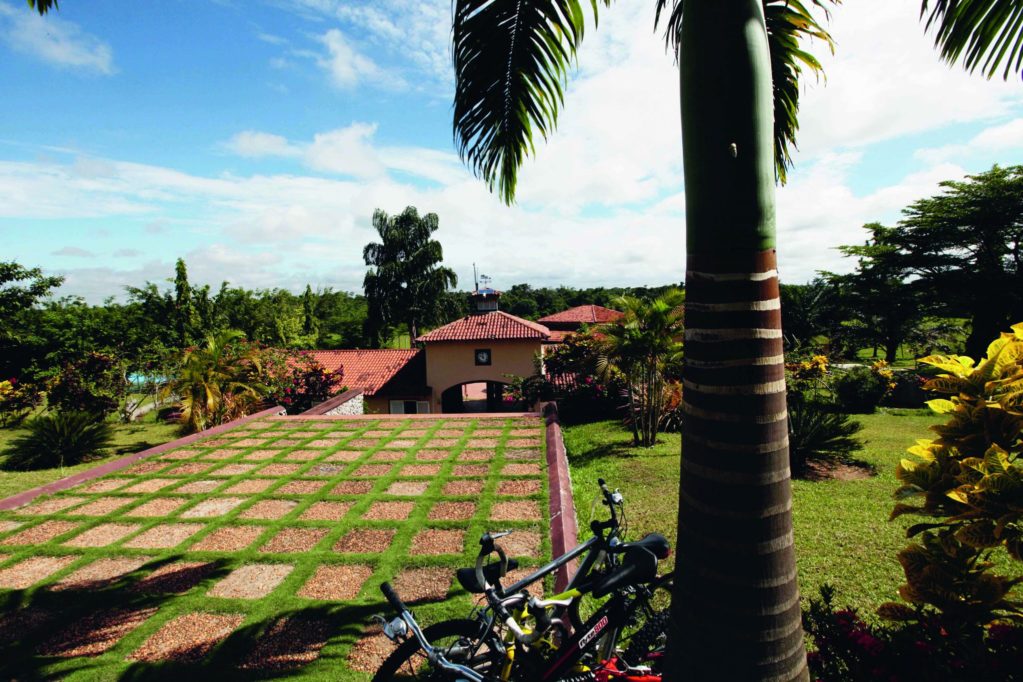Nigeria’s Niger Delta region is renowned for its rich deposits of crude oil, simmering tensions and resident activism, but is now developing into a tranquil country getaway following an amnesty granted by the government in 2009.
From Edo State in central southern Nigeria—which is home to the legendary city of Benin—to Cross River State on the southern border with the Cameroon, an estimated 38 billion barrels of oil lies beneath this tropical nation. Oil has been the dominant source of revenue to the country’s economy since its discovery in the 1950s. From the 1980s until the past year, it is estimated that over $400 billion has been accrued to Nigeria’s government and the international oil companies that are its joint venture partners.

Abraka Turf and Country Club in the Niger Delta
Delta State’s economy is largely built around the oil industry but in the town of Abraka, a few miles away from the Escravos River where the global giant Chevron has its main production facility, a veteran entrepreneur is banking on developing the tourism industry in this beautiful, but scarred area of Nigeria.
Polo enthusiast and optimist Albert Esiri has invested in developing the Abraka Turf and Country Club. Nestled on the banks of the fabled Ethiope River, which is reputed to have the clearest waters in West Africa, the club offers a tranquil country getaway from the bustling activities of the towns and cities in Africa’s most populous country.
Surrounded by rich tropical rain forests, the club was developed to project the natural beauty of the region, while offering a range of leisure and luxury activities such as horseback riding, quad biking, massage and spa treatments, golf, squash, swimming and even a rainforest trek.
A man-made lake, which was dredged from the Ethiope River, lets tourists enjoy canoeing and kayaking, among several other activities. Given the relative quietness of Abraka, a town that is a far cry from the boisterous commercial cities and towns, Esiri appears to have taken a major gamble by developing a facility for the more affluent in a little-known town in Nigeria’s countryside. To him, this is precisely what makes the club special.
“Abraka is a beautiful place, the climate is tropical with a combination of mild and heavy rains in the wet season and warm summer days in the dry season; the vegetation is green and fertile, providing a spectacular backdrop over the land, and the town is peaceful and easy going, which makes it all the more relaxing and enjoyable.
“These combine to make our club a unique proposition and one that is unrivalled by any of the resorts in Lagos or elsewhere,” says Esiri.
A lover of arts and a painter himself, Esiri had an art gallery installed and often hosts viewing sessions for art enthusiasts. The club also encourages budding artists by allowing them to stay for free for a period every year so that they can draw inspiration from the natural surroundings. Several artefacts by local artists, including a distinctive sculptured horse that is housed in the courtyard by the stables, are strewn around the club—which has over 30 chalets, duplexes and bungalows.
A key highlight of the resort is the equestrian activities, which are inspired by Esiri’s love for polo. Having developed an affinity for the game in his youth, he decided to incorporate polo into the activities at the club and has been hosting an annual international polo tournament over Easter weekend for a number of years.
The stables house over 30 horses, some of which were bred there. Esiri notes that he had been warned that it was not possible to breed horses in Abraka.
“When I mentioned my plans about breeding horses down here back when I was starting to develop the place, I was told that it wasn’t possible to breed ponies because of the tsetse fly, which is said to carry a virus that could fatally infect the horses. I went ahead, nonetheless, based on my instincts, and today I’ve bred a number of horses here, in addition to those which were brought in from abroad.”
Esiri believes that the club is a reflection of the potential for tourism in Nigeria.
“We’ve got all the ingredients in this country to make it a tourist haven. Although we lack a few things such as a proper service culture, which is perhaps the most vital ingredient in terms of tourism, I believe that with just a bit of commitment from the stakeholders something significant can be made out of the resources and potential that we possess.”
He says that the government has not done much to encourage entrepreneurs like him, who do not require funding, and that basic infrastructure needs to be put in place. But despite the odds, he is determined to continue to champion the cause of tourism. When asked how he has been able to overcome the obstacles, he shrugs and responds with a smile saying, “I enjoy swimming against the tide.”
